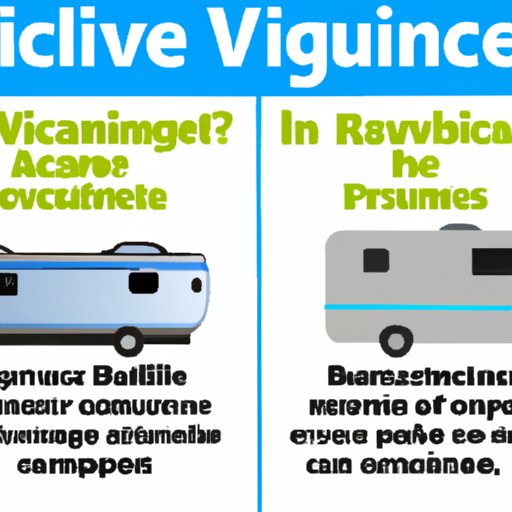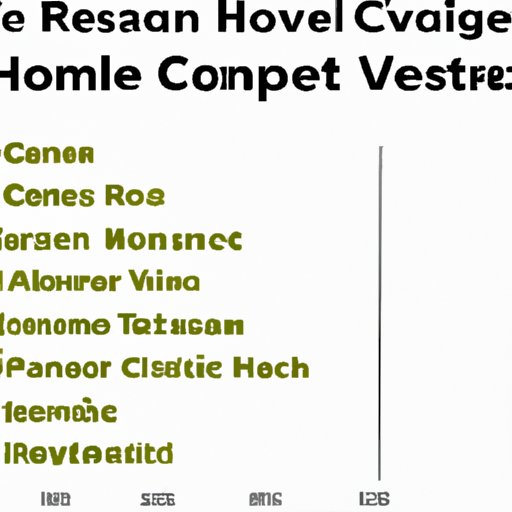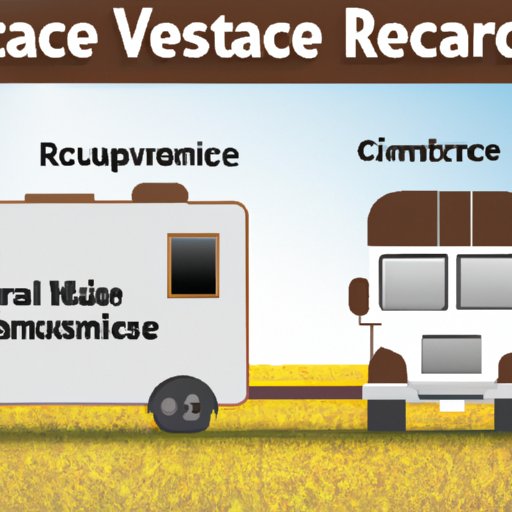Introduction
Recreational vehicles (RVs) are a popular way to travel and explore the country. Whether you’re taking a cross-country road trip or just camping in your local area, an RV can provide all the comfort and convenience of home on the go. But with any type of vehicle, it’s important to have the right insurance policy in place to protect yourself financially in case of an accident. That’s why RV insurance is so important – but how much does it cost?
Overview of RV Insurance Cost Factors
When it comes to insuring your RV, there are several cost factors to consider. The type of vehicle, age of the driver, driving record, length of the trip, and coverage options all play a role in determining the cost of your RV insurance. Here’s a closer look at each factor.
Type of Vehicle
The type of RV you have will affect the cost of your insurance. Generally, larger vehicles like motorhomes are more expensive to insure than smaller ones like pop-up campers. This is because they require more coverage to protect the additional components and features.
Age of Driver
Insurance companies take the age of the driver into account when calculating RV insurance costs. Drivers under the age of 25 tend to pay higher premiums due to their inexperience and greater risk of being involved in an accident.
Driving Record
Your driving record is also taken into consideration when determining RV insurance costs. If you have a history of traffic violations or accidents, you may be seen as a higher risk and thus charged higher premiums.
Length of Trip
The length of your trip will also be factored into your RV insurance costs. If you plan to travel for an extended period of time, you may need to purchase additional coverage to protect your vehicle while you’re away.
Coverage Options
Finally, the coverage options you choose will play a role in the cost of your RV insurance. More comprehensive policies typically cost more, but they can provide greater financial protection in the event of an accident.

Comparison of Different Types of RV Insurance Policies
There are several different types of RV insurance policies available, so it’s important to understand the differences between them before making a decision. Here’s a comparison of the most common types of RV insurance.
Full-time Coverage
Full-time coverage provides the most comprehensive protection for your RV. It covers both liability and physical damage, and it also includes protection for personal items inside the RV. This type of coverage is ideal for those who use their RV full-time.
Partial Coverage
Partial coverage is designed for those who only use their RV occasionally or seasonally. It provides liability coverage, but not physical damage coverage, which means you won’t be protected if your RV is damaged in an accident. This type of coverage is typically less expensive than full-time coverage.
Liability Coverage
Liability coverage protects you financially in the event that you are responsible for an accident. It covers medical expenses, property damage, and other costs associated with an accident. This type of coverage is usually required by law, and it’s often included in full-time and partial coverage policies.
Collision & Comprehensive Coverage
Collision and comprehensive coverage provide protection for your RV in the event of an accident or other covered incident. These policies cover the cost of repairs or replacement of your RV, up to the value of the vehicle. They are typically included in full-time coverage policies, but not in partial coverage policies.

Tips for Finding the Best RV Insurance Rates
Finding the best RV insurance rates requires some research and comparison shopping. Here are some tips to help you get started:
Shop Around
It’s always a good idea to compare rates from multiple insurance companies to make sure you’re getting the best deal. Don’t be afraid to ask questions and negotiate for better rates.
Consider Bundling
If you already have car or home insurance, you may be able to bundle your RV insurance with the same company for a discounted rate. This can be a great way to save money while still getting the coverage you need.
Ask About Discounts
Many insurance companies offer discounts for certain groups, such as members of AAA or AARP. Be sure to ask about any discounts that may be available to you.
Read Reviews
It’s also a good idea to read reviews of different insurance companies to get an idea of their customer service and overall reputation. You want to choose a company that has a track record of providing quality coverage and excellent customer service.

Average Cost of RV Insurance by State
The average cost of RV insurance varies by state. Here’s a look at the average cost of RV insurance in a few states:
Alabama
In Alabama, the average cost of RV insurance is $1,139 per year. This is slightly higher than the national average of $1,078.
California
In California, the average cost of RV insurance is $1,636 per year. This is significantly higher than the national average, likely due to the high cost of living in the state.
Florida
In Florida, the average cost of RV insurance is $1,563 per year. This is slightly higher than the national average, likely due to the state’s higher-than-average population density.
New York
In New York, the average cost of RV insurance is $1,695 per year. This is significantly higher than the national average, likely due to the state’s high cost of living.
How to Calculate Your Own RV Insurance Costs
If you want to calculate your own RV insurance costs, here are the steps you should follow:
Determine Coverage Needs
First, determine what type of coverage you need for your RV. Consider factors such as the length of your trips, the value of your RV, and the amount of liability coverage you require.
Calculate the Value of Your RV
Next, you’ll need to calculate the value of your RV. This will help you determine the amount of coverage you need and the premium you’ll pay for it.
Calculate Your Deductible
Your deductible is the amount of money you’ll have to pay out of pocket in the event of a claim. The higher your deductible, the lower your premiums will be.
Calculate Your Premium
Finally, you can calculate your premium based on the coverage needs you’ve determined and the deductible you’ve chosen. Be sure to shop around for the best rates.
Benefits of RV Insurance and Why It’s Worth the Price
RV insurance is worth the price for the financial protection it provides. Here are some of the benefits of having RV insurance:
Financial Protection
RV insurance provides financial protection in the event of an accident or other covered incident. It can help cover repair costs, medical expenses, and other costs associated with an accident.
Peace of Mind
Having RV insurance can give you peace of mind knowing that you’re protected in case of an accident. This can allow you to enjoy your travels without worrying about the potential financial consequences of an accident.
Legal Assistance
RV insurance can also provide legal assistance in the event of an accident. Many policies include legal representation in the event of a lawsuit, which can be invaluable in helping you fight for a favorable outcome.
Conclusion
RV insurance is an important part of owning an RV. It provides financial protection in the event of an accident, as well as peace of mind knowing that you’re covered. The cost of RV insurance varies depending on a number of factors, including the type of vehicle, age of the driver, driving record, length of the trip, and coverage options. By shopping around and comparing rates, you can find the best deal for your RV insurance needs.
(Note: Is this article not meeting your expectations? Do you have knowledge or insights to share? Unlock new opportunities and expand your reach by joining our authors team. Click Registration to join us and share your expertise with our readers.)
